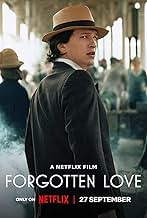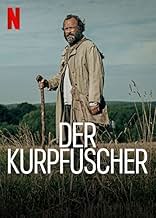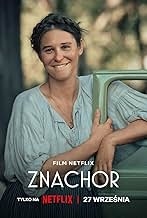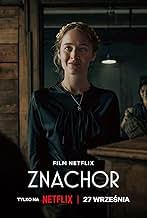VALUTAZIONE IMDb
7,5/10
12.802
LA TUA VALUTAZIONE
Un chirurgo, un tempo stimato, che ha perso la famiglia e la memoria, ha una possibilità di redenzione quando riallaccia i rapporti con una persona del suo passato.Un chirurgo, un tempo stimato, che ha perso la famiglia e la memoria, ha una possibilità di redenzione quando riallaccia i rapporti con una persona del suo passato.Un chirurgo, un tempo stimato, che ha perso la famiglia e la memoria, ha una possibilità di redenzione quando riallaccia i rapporti con una persona del suo passato.
- Regia
- Sceneggiatura
- Star
- Premi
- 8 candidature totali
Recensioni in evidenza
Forgotten Love is a pre-war Polish epic that belongs in the company of Les Misérables, Dr. Zhivago, and Gone with the Wind, to name a few of the grand stories that depict love, its loss, its renewal, and the effects it has over generations of families and countries. This Netflix third adaptation of a cherished classic novel, The Quack, brings freshness, period perfect costumes, and production design for a complete cinematic experience.
A renowned surgeon loses his memory after an attempted robbery in a dark street. Lost and confused, he roams the country for decades not knowing who he is or whatever happened to the little daughter his estranged wife stole from him. His love in this dynamic period piece is both for his lost daughter and his lost occupation, which once made him the top brain surgeon in the country but now catapults him from the upper class to the lower.
Director Michal Gazda quietly shows in a series of remarkably affecting scenes how this lost man saves lives without knowing why and comes closer to finding his daughter than he could ever realize. While his amnesia is persistent, the film shows how something as deeply felt as a gifted skill and its passion manifest even without realizing it. Lesek Lichota gently plays the heroic Doctor Wilczur with such finesse and understatement that none can deny his greatness.
After a few improbable incidents, including Polish magical realism, the doctor emerges. Along the way, the film emphasizes the class divide through the secondary romance of the doctor's daughter, Maria (Maria Kowalska) with Count Czynski (Mikolaj Grabowski).
A society that can deny peasants' medical needs and thwart the integration of love between those boundaries reveals a cruelty that only heroes like the doctor and his daughter can overcome. The film consistently emphasizes the class divide and its attendant injustices.
While Forgotten Love at times evokes tears in the delicacy of love forsaken, the film grounds itself in the reality of lost love and class warfare to the dramatic extent that reconciliations might not happen, so determined fate seems to be to deny happiness and, most of all, love.
Forgotten Love is one of the best international films of the year that satisfies our need for romance in art that leaves us happy to be human.
A renowned surgeon loses his memory after an attempted robbery in a dark street. Lost and confused, he roams the country for decades not knowing who he is or whatever happened to the little daughter his estranged wife stole from him. His love in this dynamic period piece is both for his lost daughter and his lost occupation, which once made him the top brain surgeon in the country but now catapults him from the upper class to the lower.
Director Michal Gazda quietly shows in a series of remarkably affecting scenes how this lost man saves lives without knowing why and comes closer to finding his daughter than he could ever realize. While his amnesia is persistent, the film shows how something as deeply felt as a gifted skill and its passion manifest even without realizing it. Lesek Lichota gently plays the heroic Doctor Wilczur with such finesse and understatement that none can deny his greatness.
After a few improbable incidents, including Polish magical realism, the doctor emerges. Along the way, the film emphasizes the class divide through the secondary romance of the doctor's daughter, Maria (Maria Kowalska) with Count Czynski (Mikolaj Grabowski).
A society that can deny peasants' medical needs and thwart the integration of love between those boundaries reveals a cruelty that only heroes like the doctor and his daughter can overcome. The film consistently emphasizes the class divide and its attendant injustices.
While Forgotten Love at times evokes tears in the delicacy of love forsaken, the film grounds itself in the reality of lost love and class warfare to the dramatic extent that reconciliations might not happen, so determined fate seems to be to deny happiness and, most of all, love.
Forgotten Love is one of the best international films of the year that satisfies our need for romance in art that leaves us happy to be human.
The film attracts your attention with its emotional depth. While we follow what is happenning to Doctor Wilczur, we also witness the warm, hopeful love story of Marysia and Count Czynski. The cinematography, set design and music are quite impressive. Peaceful rural landscapes, villages, peasants... Everything and everyone in this movie is very native and convincing, every scene reveals the hard work done. The performances of the lead actors Leszek Lichota and Maria Kowalska add originality to their characters, I admire both of them pretty much. My only negative comment about the movie is that the ending seemed a bit rushed, they could have made a great mini-series from this movie..
Znachor adaptation directed by Jerzy Hoffmann remains one of most touching films of my childhood.
So, the curiosity, some serious reserves, the certitude than Jerzy Binczycky has no pair but provocated by the courage of Michael Gazda, I saw it.
And it is far to be dissapointed experience. In fact, two virtues define it - the splendid portrait of Poland life between wars and the high loyalty to the novel.
Sure, the acting is basic virtue and the story grows up with inspired crafted dramatism. But the second virtue is the wise recreation of atmosphere, using old buildings and clothes, nice cinematography , fair use of nature.
The story is familiar and its dramatic reflexes, good use of humor drops, the dialogue are great good points. And, indeed, Leszek Lichota is fair option for Professor.
In short, just a beautiful gift.
So, the curiosity, some serious reserves, the certitude than Jerzy Binczycky has no pair but provocated by the courage of Michael Gazda, I saw it.
And it is far to be dissapointed experience. In fact, two virtues define it - the splendid portrait of Poland life between wars and the high loyalty to the novel.
Sure, the acting is basic virtue and the story grows up with inspired crafted dramatism. But the second virtue is the wise recreation of atmosphere, using old buildings and clothes, nice cinematography , fair use of nature.
The story is familiar and its dramatic reflexes, good use of humor drops, the dialogue are great good points. And, indeed, Leszek Lichota is fair option for Professor.
In short, just a beautiful gift.
What a nice surprise of a movie! Kind of liked everything about this movie. The actors are great and don't come across like spoiled Hollywood brags. The backdrops are calming without too much overwhelming design, just simplicity of rural living. The music seems appropriately selected and the cinematography is beautifully done. Yeah, the end is predictable, but at the same time something the viewer is expecting from it, so can't fail this either. Anyways, a well deserved 10/10, and believe me when I say that I don't often give movies this rating. It's a story that needed to be told, and I'm so glad it's not done by Hollywood. Thumbs up!
International audiences should know where the negative opinions of some Polish film reviewers come from. Well, the book Znachor (The Quack), written in 1937 by Tadeusz Dolega-Mostowicz (initially as a screenplay), lived to see three screen adaptations. The first one, directed by Michal Waszynski, was also filmed in 1937, the second one, directed by Jerzy Hoffman, premiered in 1981, and this one, albeit a rather loose adaptation of the novel (especially when it comes to the character of Professor Dobraniecki, who is a disgusting character in the book) gained recognition from Polish audiences and acquired the status of an icon of Polish cinematography, and icons are not touched in Poland. At least that's what some people think, especially those who can't tear themselves away from what was, no matter what the quality of the new one is.
Meanwhile, the new adaptation (yes adaptation, not remake) of the novel "The Quack", which has the international title "Forgotten Love", is a brilliantly shot, charming film about love, goodness, loyalty to principles and a bit about Poland as it was between the World Wars. Wonderful cinematography, great music interwoven with folk songs, set and costume design, and excellent acting (there really is no weak role in this film) make you travel back in time to the first half of the 20th century for 2 hours and 20 minutes feeling as if you are almost there, in the beautiful Polish countryside. You will love the characters and identify with them, and when the film is over you will want to watch it again. In the previous version, Hoffman made the rascal Dobraniecki into a knight on a white horse who rescues Professor Wilczur from his oppression; in this version, this miserable careerist and scoundrel remains himself to the end, just as in the book. Fans of Hoffman's film will not find the iconic courtroom scene in Forgotten Love, but this could not have happened if the authors had decided to be consistent with Dobraniecki's character. Instead, there is a new version of it, in my opinion more logical, beautiful and truly moving. And the ending? Also different, also consistent with the adaptation adopted and really beautiful. So, don't look at the frustrators and retrogrades, just watch this film and I assure you that not only will you not regret it, but you will experience more than 2 hours of emotion, laughter, reflection and a bit of history, all in beautiful landscapes and scenery that will not return. Highly recommended.
Meanwhile, the new adaptation (yes adaptation, not remake) of the novel "The Quack", which has the international title "Forgotten Love", is a brilliantly shot, charming film about love, goodness, loyalty to principles and a bit about Poland as it was between the World Wars. Wonderful cinematography, great music interwoven with folk songs, set and costume design, and excellent acting (there really is no weak role in this film) make you travel back in time to the first half of the 20th century for 2 hours and 20 minutes feeling as if you are almost there, in the beautiful Polish countryside. You will love the characters and identify with them, and when the film is over you will want to watch it again. In the previous version, Hoffman made the rascal Dobraniecki into a knight on a white horse who rescues Professor Wilczur from his oppression; in this version, this miserable careerist and scoundrel remains himself to the end, just as in the book. Fans of Hoffman's film will not find the iconic courtroom scene in Forgotten Love, but this could not have happened if the authors had decided to be consistent with Dobraniecki's character. Instead, there is a new version of it, in my opinion more logical, beautiful and truly moving. And the ending? Also different, also consistent with the adaptation adopted and really beautiful. So, don't look at the frustrators and retrogrades, just watch this film and I assure you that not only will you not regret it, but you will experience more than 2 hours of emotion, laughter, reflection and a bit of history, all in beautiful landscapes and scenery that will not return. Highly recommended.
Lo sapevi?
- QuizRemake of the 1981 film Znachor (1982), The Quack.
- BlooperPolish vehicle registration plates from before 1937 should have red letters (KL in this case, meaning Kielce voivodeship), not black (what is difficult to learn from black and white photos).
I più visti
Accedi per valutare e creare un elenco di titoli salvati per ottenere consigli personalizzati
- How long is Forgotten Love?Powered by Alexa
Dettagli
- Tempo di esecuzione2 ore 20 minuti
- Colore
- Mix di suoni
- Proporzioni
- 2.35 : 1
Contribuisci a questa pagina
Suggerisci una modifica o aggiungi i contenuti mancanti


![Guarda Trailer [OV]](https://m.media-amazon.com/images/M/MV5BOWE0MTBhNmQtYjVkMi00ODU1LWE1ZDYtNmMyMzFiODU3MzA3XkEyXkFqcGdeQXRyYW5zY29kZS13b3JrZmxvdw@@._V1_QL75_UX500_CR0)
































